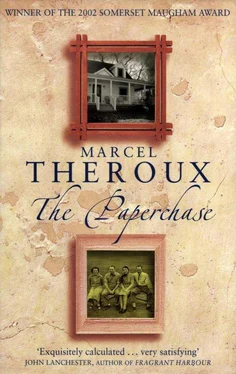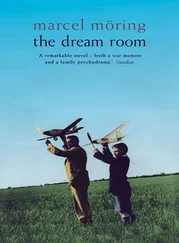‘None of us let him down,’ my father said.
I had my shoes in my hand. The spiky lawn was prickling the soles of my bare feet. ‘Post-mortem?’ I said, cheerily.
A wary look came over my father’s face, but he said nothing.
I caught the ferry back to the mainland that evening. I almost regretted leaving when I looked behind us and saw the lights of the harbour being eclipsed by the black edge of the horizon. I felt like I was saying goodbye to it for ever. I decided then that that was the reason I had come. That had been the meaning of my climacteric. The last person in my family that meant anything to me had died. There was no one left for me in this country of a quarter of a billion people. I was heading back to my poky flat on my own draughty island and I would be staying there until my three-score years and ten were up. So long, New World.
It suddenly got very cold. I went below to get out of the wind and on one of the lower decks I bumped into Patrick’s Latvian roommate from law school, Edgar Huvas, who mistook me for Vivian. I remembered him vaguely from his summer visits. He had a photographic memory and an obsession with women’s necks, and looked like the Pillsbury doughboy. He had never been invited back after an incident in a clam bar where he tried to lick the waitress’s neck as she leaned over to take his plate.
I offered him a lift to Providence, thinking I could use the company and that maybe he had anecdotes about Patrick’s law-school days, but he fell asleep after ten minutes and only woke when I pulled up at the bus station. He shook my hand limply. ‘Thanks, Vivian,’ he said. I couldn’t be bothered to correct him. He took the carrier bag containing the books he had just stolen from Patrick’s library and ambled off to buy his ticket. I watched him leave. I thought about stopping in New Haven for a pizza, but in the end decided to see if I could catch an earlier flight to London, so I drove nonstop to Newark.
I was starving by the time we took off. I ate and enjoyed the in-flight meal: all of it — wrinkly roll, jaundiced salad, and trifle. I wondered if that was a sign of age. Once upon a time just the smell of aeroplane food had made me want to puke.
After the meal the cabin crew dimmed the lights for our three-hour parody of a good night’s sleep. The rushing Atlantic wind outside the aircraft made me feel chilly so I got my jacket from the overhead rack and took out the clanking box of pencils and the pair of notebooks I had picked up about a thousand miles before.
Flicking through them, I saw that only one was completely blank. The other was about a third used. Patrick had started writing in the back of it. It began in bursts: notes at first, a word, a squiggle, a crossing-out, then sentences and whole paragraphs which ran through the book in reverse like pages of Arabic. It looked as though Patrick had intended to write a line or two and then been hijacked by an onrush of inspiration. About three pages in, it began to flow pretty much uninterruptedly. The angle of the handwriting altered where the velocity and pressure of the pen had increased — the way an animal running compresses its body for speed. Letters blurred together, words were skipped; some of the paragraphs sprouted thought balloons as though Patrick were marking places that he wanted to return to and amplify.
It was only a fragment: the beginning of a love story written in a pastiche of nineteenth-century prose, but beneath the formal pseudo-Victorian writing, I seemed to catch the inflections of a real voice — one that I hadn’t heard for almost twenty years. ‘More than fifty years have passed’, it began, ‘since the day I arrived in the capital by post-chaise, and watched the Thames, shirred like a matron’s bustle, foaming into ribbons of lace beneath the arches of London Bridge.’
MORE THAN fifty years have passed since the day I arrived in the capital by post-chaise and watched the Thames, shirred like a matron’s bustle, foaming into ribbons of lace beneath the arches of London Bridge. Old age, while dimming every useful faculty, has left the colours of that memory untouched. In the late afternoon light, the river shone as though gilded with the same aureate brush that seemed poised to draw the lineaments of my own future.
It was ten years after the Mutiny, the old East India Company had been wound up, and a new generation of gentlemen administrators were selected by competitive examinations to carry on its work. Some of them were bindlestiffs, slack-jawed second sons of country parsons who were doomed to wither like earthworms in the tropics. Others were cads of the old school: straitened Beau Brummel types, without the money to be malcontents. They oozed upwards in the service, their heads pomaded with smarm, their sharp elbows working like paddles on a riverboat. But a few young men were drawn by a sense of duty: a word which wasn’t then pronounced as though it savoured of rotten cheese. They believed their vocation was to carry out the Queen’s command, to secure the country’s prosperity, to promote works of public utility among her dominions. Was it sanctimony? Or arrogance? Or wide-eyed hopefulness? Choose wisely and absolve me, reader. I was one of them.
The day following my arrival I walked through the garboil of West End streets to a clerk-infested antechamber on Whitehall. A certain Mr Ricketts came to fetch me before luncheon. As his head peeped around the door, one of his eyes was cast ceilingwards in a manner that might have signified a reflective mood in its owner, were the other not beadily roving up and down my person.
‘Bad news for you, I’m afraid, young man,’ he said, when I had taken my seat in his office.
‘Bad news?’
‘We had you down for a politico in the Rajputana, but rather a rum state of affairs have come to light in the district where you was to have been sent. Smoked out a circle of aspiring mutineers. Seems one of them broke cover about a week before it was supposed to happen. We stamped down hard on it, of course. Hanged some, spared others, blew the ringleaders out of cannons. But all in all, matters stand somewhat ticklish. It’s not the place to break in new blood. We’re of a mind that it would be best for you to hang fire. Cool your heels in London for a couple of months, while we sort out another posting. A young chap like yourself can’t have any objections to that.’
All through this little peroration, his left eye was busily absorbed in the pattern on the ceiling while the right remained fixed upon me. It gave the impression that Mr Ricketts’ mental processes were so valuable, he could only expend 50 per cent of them on anything in his immediate vicinity; the remaining capacity being reserved, presumably, for calculations on behalf of Her Majesty’s government.
I told him that notwithstanding my eagerness to commence my service, I would bow to the wiser counsel of my superiors.
‘Very good,’ he murmured, and as a signal that the interview was at an end, his right eye snapped downwards onto the paper in front of him, while the left continued staring upwards, as though the reserved part of his cerebellum was devising further torments for the contumacious Hindoo regiments.
His counsel had provoked in me an opposite response to the one intended: it inflamed my enthusiasm to embark immediately. But since there was nothing to be done, I took rooms in Dover Street and passed four pleasant months in the capital.
It was during this time that I made the acquaintance of a young woman called Serena Eden. [ Patrick had tried and rejected several equally unlikely alternatives including Ethel Younghusband, Cissy Spanks and Dara Nightshade, but his final choice obviously pleased him — DM .]O was ever human beauty so aptly named! In her name and in the deep, hurt ebony of her lustrous eyes she carried the very echo of lost paradise. Her name was beautiful, but less beautiful than she: she was a fawn, a nymph, an amaranth, a sacred flower.
Читать дальше












